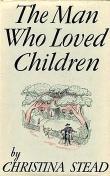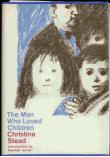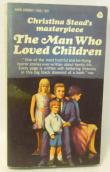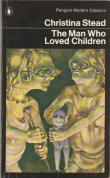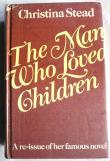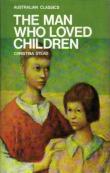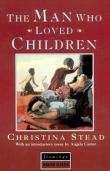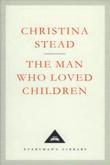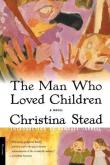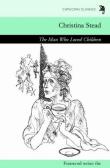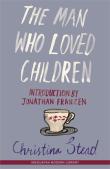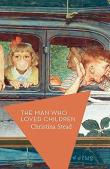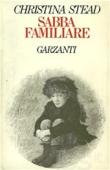AustLit
Latest Issues
AbstractHistoryArchive Description
'Set in Washington during the 1930s, Sam and Henny Pollit are a warring husband and wife. Their tempestuous marriage, aggravated by too little money, lies at the centre of Stead's satirical and brilliantly observed novel about the relations between husbands and wives, and parents and children.
'Sam, a scientist, uses words as weapons of attack and control on his children and is prone to illusions of power and influence that fail to extend beyond his family. His wife Henny, who hails from a wealthy Baltimore family, is disastrously impractical and enmeshed in her own fantasies of romance and vengeance. Much of the care of their six children is left to Louisa, Sam's 14-year-old daughter from his first marriage. Within this psychological battleground, Louisa must attempt to make a life of her own.'
Source: Publisher's blurb (MUP).
Reading Australia
This work has Reading Australia teaching resources.
Unit Suitable For AC: Senior Secondary Literature (Unit 4)
Curriculum Summary
Find a summary table for Australian Curriculum: English content descriptions and NSW Syllabus outcomes for this unit.
Themes
adolescence, childhood, coming of age, family, relationships, teenagers, trauma
General Capabilities
Critical and creative thinking, Ethical understanding, Intercultural understanding, Literacy, Personal and social
Contents
-
An Unread Book,
single work
criticism
(p. v-xli)
Written as an introduction to the 1965 reprint of The Man Who Loved Children, American critic Jarrell's 'enthusiastic' essay stimulated a revaluation of Christina Stead's work. (Oxford Companion to Australian Literature). The essay has been reprinted in numerous editions of the novel since 1965.
Publication Details of Only Known VersionEarliest 2 Known Versions of
Other Formats
- Braille.
- Sound recording.
- Large print.
Works about this Work
-
'Shut Up Or I’ll Shut You Up' : Family Violence In Christina Stead’s The Man Who Loved Children
2019
single work
criticism
— Appears in: Philament , September no. 25 2019; 'In an essay for The New York Times titled “Rereading The Man Who Loved Children,” author Jonathan Franzen writes the following of Christina Stead’s famous 1940 novel: it “operates at a pitch of psychological violence that makes Revolutionary Road look like Everybody Loves Raymond.” The novel, Franzen further suggests, is “so retrograde as to accept what we would call ‘abuse’ as a natural feature of the familial landscape” and intrudes “on our better-regulated world like a bad dream from the grandparental past.” The Man Who Loved Children follows the experiences of the dysfunctional Pollit family, which consists of Samuel (“Sam”) Pollit, Sam’s second wife Henny Collyer, and their six children. It chronicles the family’s attempt to navigate the destabilised political and cultural landscape of Washington, DC, in the 1930s and during the Great Depression.2 Despite the novel’s pleasant-sounding (and ironic) title, even the most cursory reading of the book reveals the shocking scope and volume of abuse and violence between its covers—violence ranging from verbal insults and threats through to physical assault, gaslighting, surveillance, rape, murder, and suicide. While the novel’s violence is primarily perpetrated by Sam and directed towards Henny and their children, some violence is also perpetrated by Henny and directed towards Sam and the children. Despite the novel’s shocking depictions of abuse, Franzen characterises the violence as “a potentially comic feature”—extreme to the point of absurdity. Indeed, for those not familiar with the complexities and realities of family violence, the language and behaviours of the novel’s characters may at first appear unbelievable, even melodramatic. But a reading of the novel that takes the characters’ violence seriously—particularly in light of Hazel Rowley’s claim that that the novel constitutes a recount of Stead’s traumatic childhood “exactly word for word”3—suggests not only that the The Man Who Loved Children is a believable violence narrative, but one that is consistent with several theories of family violence expounded in the social sciences over the last two decades. In this article, I propose to reread Stead’s novel in light of these contemporary sociological theories of violence, and to demonstrate that family violence has changed very little in the 70 years since the novel’s publication. Indeed, as I will argue, The Man Who Loved Children contains one of the most nuanced and insightful explorations of family violence in twentieth-century Australian fiction.' (Introduction) -
y
 Christina Stead and the Matter of America
Sydney
:
Sydney University Press
,
2019
17267523
2019
multi chapter work
criticism
Christina Stead and the Matter of America
Sydney
:
Sydney University Press
,
2019
17267523
2019
multi chapter work
criticism
'Although Christina Stead is best known for the mid-century masterpiece set in Washington D.C. and Baltimore, The Man Who Loved Children, it was not her only work about the America. Five of Christina Stead’s mid-career novels deal with the United States, capturing and critiquing American life with characteristic sharpness and originality.
'In this examination of Stead’s American work, Fiona Morrison explores Stead’s profound engagement with American politics and culture and their influence on her “restlessly experimental” style. Through the turbulent political and artistic debates of the 1930s, the Second World War, and the emergence of McCarthyism, the “matter” of America provoked Stead to continue to create new ways of writing about politics, gender and modernity.
'This is the first critical study to focus on Stead’s time in America and its influence on her writing. Morrison argues compellingly that Stead’s American novels “reveal the work of the greatest political woman writer of the mid twentieth century”, and that Stead’s account of American ideology and national identity remains extraordinarily prescient, even today.'
Source: Publisher's blurb.
-
Australien
2019
single work
criticism
— Appears in: Verdenslitteraturer : Introduktion til litteraturen uden for Europa 2019; (p. 253-284) -
A Rebel and a Wanderer : Christina Stead
2018
single work
biography
— Appears in: A Free Flame : Australian Women Writers and Vocation in the Twentieth Century 2018;'Christina Stead was always prickly about the idea of vocation. Indeed, she often insisted to interviewers that she had never had any such thing. Yet in her semi-autobiographical novel The Man Who Loved Children, she gave the character based on herself, 12-year-old Louisa, a potent sense of predestination. In one scene, Louie is cleaning her brothers' bedroom and dreaming of being an actress. Her father has just finished telling her that she looks like a gutter-rat, while downstairs her stepmother is grumbling about her 'dirt and laziness'. Her younger sister is about to ask her to carry down the slop bucket. But Louie is far away, 'declaiming...to a vast, shadowy audience stretching away into an opera house as large as the world'. Her conviction that she is extraordinary saves her from the catastrophe that is her home life. 'If I did not know I was a genius, I would die', she declares — but to herself alone. She is the ugly duckling, whose future as a glorious swan will, she knows, take her far away from the chaos and violence around her.' (Introduction)
-
Bold Women in Print
2017
single work
criticism
— Appears in: Unbound : The National Library of Australia Magazine , September 2017;'Curator Grace Blakeley-Carroll looks at early twentieth-century Australian female writers and the publishing industry.'
-
[Review] The Man Who Loved Children
2010
single work
review
— Appears in: The Monthly , November no. 62 2010; (p. 64)
— Review of The Man Who Loved Children 1940 single work novel -
An Embattled Marriage
1966
single work
review
— Appears in: The Sunday Times (London) , 26 June 1966; (p. 48)
— Review of Seven Poor Men of Sydney 1934 single work novel ; The Man Who Loved Children 1940 single work novel -
Christina Stead Continues
1940
single work
review
— Appears in: The New Yorker , 19 October no. 16 1940; (p. 84-86)
— Review of The Man Who Loved Children 1940 single work novel -
Enter 'Pollitry'
1940
single work
review
— Appears in: Saturday Review of Literature , 16 November no. 23 1940; (p. 12)
— Review of The Man Who Loved Children 1940 single work novel -
Scalpel, Please
1940
single work
review
— Appears in: The Nation , 26 October vol. 151 no. 17 1940; (p. 399)
— Review of The Man Who Loved Children 1940 single work novel -
A Walk around the World : Home and Homelessness in the Work of Christina Stead
1998
single work
criticism
— Appears in: Janette Turner Hospital 1998; (p. 1-16) -
A Note on Christina Stead and China
2003
single work
criticism
— Appears in: JASAL , vol. 2 no. 2003; (p. 93-97) Discusses the representations of China and Chinese people in Christina Stead's work. -
An Unread Book
1965
single work
criticism
— Appears in: The Man Who Loved Children 1965; (p. v-xli) Atlantic Monthly , vol. 215 no. 3 1965; (p. 166-71)Written as an introduction to the 1965 reprint of The Man Who Loved Children, American critic Jarrell's 'enthusiastic' essay stimulated a revaluation of Christina Stead's work. (Oxford Companion to Australian Literature). The essay has been reprinted in numerous editions of the novel since 1965.
-
Feminism and Male Chauvinism in the Writings of Christina Stead (1902-1983)
2003
single work
criticism
— Appears in: Hecate , vol. 29 no. 2 2003; (p. 113-122) -
A Voyage Round Her Father
2005
single work
criticism
— Appears in: The Weekend Australian , 30-31 July 2005; (p. 6)
-
cSingapore,cSoutheast Asia, South and East Asia, Asia,
-
Washington (State),
cUnited States of America (USA),cAmericas,
- 1930s

